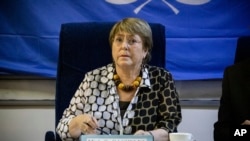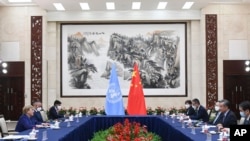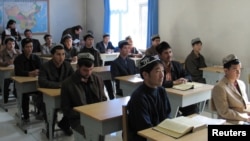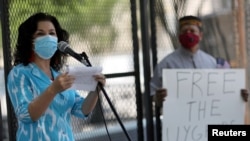Michelle Bachelet’s decision not to seek a second term as U.N. human rights chief is being seen as a “huge victory” by China rights activists.
Activists have criticized Bachelet for failing to more forcefully criticize Beijing’s forced incarceration of nearly 2 million Uyghurs in Xinjiang during her recent visit to China.
"It is a huge victory for the campaigners who are absolutely disgusted with her visit to China,” Luke De Pulford, a human rights activist and the coordinator of the Inter-Parliamentary Alliance on China, told VOA.
Bachelet’s announcement Monday came more than a week after 40 scholars who study Xinjiang published an open letter criticizing her for, among other things, repeating language used by Beijing to describe the mass internment of Uyghurs and other Turkic ethnic groups in the region.
"In her statement, Bachelet not only failed to condemn these policies, but she declined to mention any of them beyond the mass internment program, which she referred to using Beijing’s latest euphemism, 'vocational training education centers,’ ” the letter stated.
On the last day of her six-day China trip last month, Bachelet said she had “raised questions and concerns about the application of counterterrorism and deradicalization measures and their broad application – particularly their impact on the rights of Uyghurs and other predominantly Muslim minorities.”
She added that she had asked Beijing to “undertake a review of all counterterrorism and deradicalization policies to ensure they fully comply with international human rights standards.”
But according to Pulford, Bachelet failed to achieve any kind of “meaningful investigation” into Xinjiang.
“[Bachelet] did not do her job as U.N. human rights commissioner, which is to stand up for those human rights downtrodden and persecuted people,” Pulford told VOA.
After having demanded “unfettered access” to the Xinjiang region since late 2018, Bachelet finally visited the region last month – the first visit to the country by a U.N. human rights chief since 2005. But after her visit, Bachelet’s office said that the trip was not intended to be an investigation into the alleged human rights abuses.
“The access was limited, in part because of the need for a COVID bubble arrangement,” Liz Throssell, spokesperson for the U.N. human rights office, told VOA.
In a letter to the U.N. Office of the High Commissioner for Human Rights, scholars urged the office to release its “long-delayed report” on Beijing’s actions in Xinjiang and to incorporate information they have provided to the office. The scholars did not specify the details of their findings on Xinjiang but added, “We are unanimous in our understanding of what it is that the Chinese state is doing on the ground.”
“We urge the OHCHR to fully incorporate this knowledge into its long-delayed report on China’s actions in Xinjiang, and we urge the OHCHR to release the report without political interference or further delay,” the letter said.
Bachelet said Monday that the report would be released before her term ends August 31.
‘No relationship’ to criticism
Bachelet said her decision not to seek a second term “has no relationship” to the criticism of her China trip.
Speaking with reporters in Geneva, she cited a desire to return to her native Chile "because my family needs me there and because my country needs me there. So, this has no relationship. I always read when people criticize us, I listen, and I think that's part of my life.”
According to Dolkun Isa, president of the World Uyghur Congress, although Bachelet said her decision was not related to her trip, the “mounting criticism of her inability to condemn the human rights atrocities” in China must have surely played its part.
“Just last week, the World Uyghur Congress joined over 230 human rights organizations calling for her resignation,” Isa wrote in an email to VOA. “The disastrous visit to China has cost the high commissioner, and the U.N. system as [a] whole, their credibility to stand up in the face of human rights atrocities committed by powerful states like China.”
According to Rushan Abbas, founder and executive director of the Washington-based organization Campaign for Uyghurs, the next high commissioner “surely faces a daunting task to restore the U.N.'s credibility” to hold powerful states to account for human rights abuses.
“Regrettably, it will take a while to re-earn the public’s trust and to improve the U.N.’s credibility in the world’s eyes after such passivity towards the Uyghur genocide — potentially the greatest human rights failing of our time,” Abbas wrote to VOA.
Peter Irwin, a senior program officer at the Washington-based Uyghur Human Rights Project, told VOA that the rights groups “expect the next high commissioner to actually respond to the ongoing” human rights abuses in Xinjiang.
“The atrocities haven't stopped, and we'll continue to press the office to do its job,” Irwin wrote in an email to VOA.
Cha Liyou, the Chinese consul general in Kolkata, India, said on Twitter that Bachelet’s trip to China “not only vindicated, but justified” Beijing’s actions in Xinjiang.
“Anyone of reason knows Xinjiang scores better than any U.S. states with Native American reservations,” Cha said in his tweet. “As a country of world's lowest racial justice, American politicians are humiliating themselves in smearing minorities' harmony of China.”
On Tuesday, 47 countries urged Bachelet to promptly release the report on human rights in Xinjiang while calling on China to “urgently address” human rights abuses in the region.
“Numerous extensively researched and credible reports indicate that over a million people have been arbitrarily detained,” Paul Bekkers, the Dutch ambassador to the U.N. in Geneva, told the U.N. Human Rights Council.
“Furthermore, there are reports of ongoing widespread surveillance, discrimination against Uyghurs and other persons belonging to minorities, as well as of severe restrictions on Uyghur culture and the exercise of human rights and fundamental freedoms, including the right to freedom of religion or belief,” Bekkers said.
China’s U.N. ambassador, Chen Xu, condemned the Netherlands and other signatories for spreading “lies and rumors to attack China.”
“We categorically reject these allegations,” Chen said while hailing Bachelet’s visit as a trip that had “enhanced her understanding of China’s path of human rights development.”







